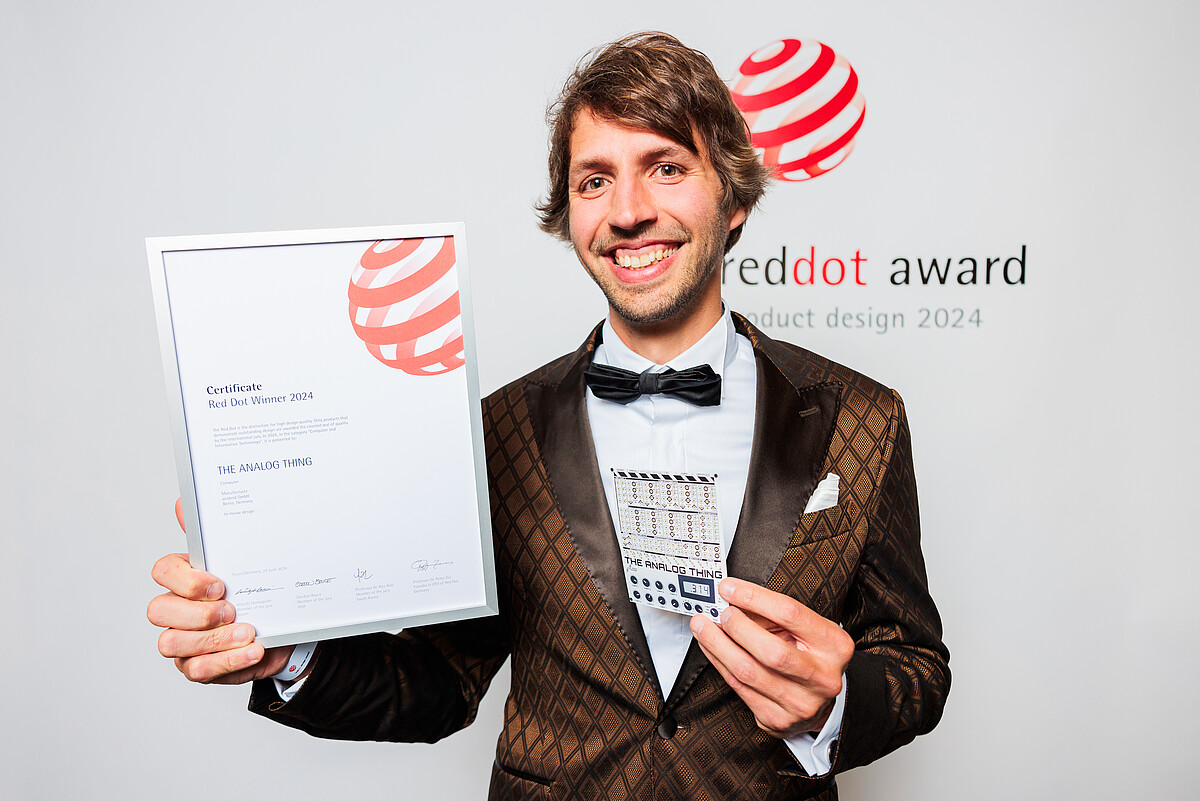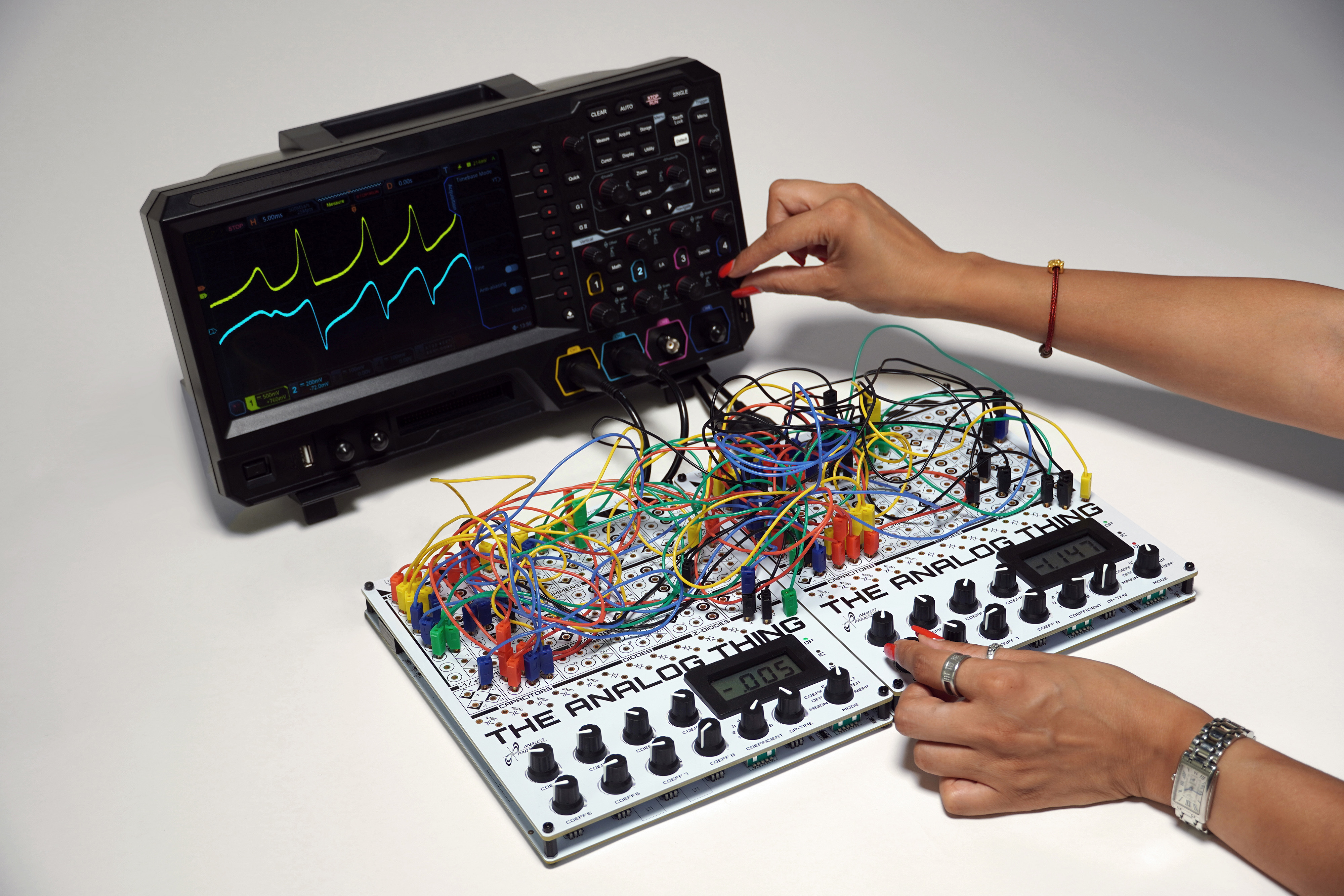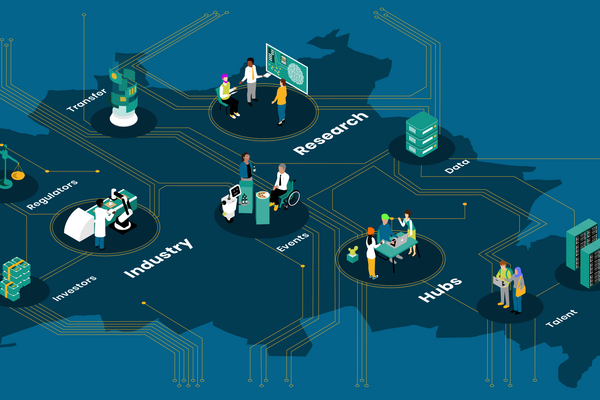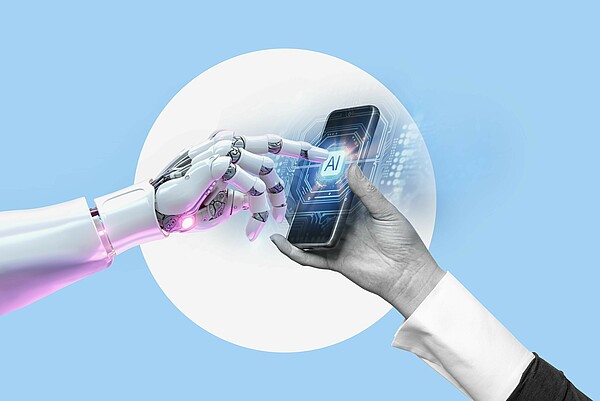“Our Vision Is to Get into Every Cellphone on the Planet”
How analog computing could change everything from AI to aerospace and medicine.
Berlin startup anabrid is turning heads with its unique approach to analog computing. We met with Sven Köppel, a quantum physicist and the company’s CSO, to discuss what it is all about. Sven delves into the concept of "analogization," shares his vision for the future of computing, and explains how analog technologies could be the key to solving some of humanity's most pressing challenges.
Hi Sven, thank you for talking to Reason-why Berlin.
Everyone is talking about digitalization, but not you. Why is that?
That's a great question. In Germany, the term digitalization is used a lot in administrative speak. In the sciences, nobody talks about digitization anymore. Everything was already digitized decades ago. Instead, we ask ourselves: What's next?
And that, of course, is the paradox: we are now talking about analogization. Computers have to become faster to solve the urgent problems of mankind. Many people are looking for new solutions, and alternative hardware is one answer.
Quantum computers are one answer, but not the only one. Analog sounds unsexy at first, especially in the context of digitalization. In politics, people are wide-eyed and perhaps think of grandma's analog radio. But we see huge opportunities. We combine the best of digital and analog information processing.
What is an analog computer? Don't you calculate with bits and bytes, not with zeros and ones?
We calculate with continuous values, i.e. with currents and voltages. In analog technology, a signal can have an infinite number of values over time. That is the big advantage. Between 0 and 1 there are 0.5 and 0.75 and all kinds of other numbers. So, we operate with "fuzzy bits", if you will.
But it's not just about analog versus digital. For us, the core of analog computing is analogy building in the sense of model building. In other words, we build a computer that is a model of a mathematical problem. Just as an analog clock is a model of our time and possibly our calendar.
That means you need a separate computer for every problem. Did I understand that correctly?
Yes, exactly. In classical analog computing, you actually have to create a separate circuit diagram for each problem. You used to have these circuit diagrams on large tableaus and exchange them. But of course, we no longer do that today. We make this circuit software-definable. That's the new thing, and it makes analog computing highly interesting again.
Why do you need analog computers?
There are many possible uses. In the 60s and 70s, there was a whole industry, especially in Germany, where this type of computer was very common - electronic analog computers. They were big boxes with lots of wires. They were used for things like crash testing or calculating flight paths. The flight to the moon was largely supported by this type of computer.
There is no software in the analog computer, is there?
That's right. It doesn't work algorithmically; it works continuously, calculating all the time. We use digital computers to control the analog computer. That is hybrid computing.
Is our brain an analog computer?
That is a very interesting question and of course also a philosophical one.
In any case, the brain is not exclusively determined by digital information processing but also uses analog information processing. Some scientists see a single neuron as a binary, 'digital' entity - either 'on' or 'off', firing or not firing. However, interconnected neurons that carry out cognitive processes are much more complicated, depending on analog properties such as neurotransmitter concentrations, pH levels, temperature, and so on, which determine the probability that some neurons fire. Processes in the brain are neurophysiological mechanisms that exhibit both digital and analog properties.
So is it a hybrid computer?
Possibly. In any case, what we can say is that the breakthroughs in AI with GPTs that have caused so much excitement in recent years are based on a model of the brain that is incredibly simplistic and, if you will, has very little to do with how the human brain works. An analog model brings us much closer to how the brain works.
In this sense, we are actually biologically inspired. There is also the term "neuromorphic computing" for this type of computer architecture, which is modeled on the human brain.

What are the areas of application for analog computers today?
Right now, of course, the focus is on AI. But we have a broader perspective. For us, this is just one of many applications. We also solve many other problems where current computers reach their limits. We operate in the field of high-performance computing, scientific computing. Applications include protein folding or personalized medicine. Or weather forecasting, tsunami forecasting, earthquake forecasting. Or applications where you have to get by with very little energy, low-power computing. Think of implanted insulin pumps or hearing aids.
What are the key benefits?
There are several benefits that are relevant depending on the customer's needs. One is energy consumption. We're not talking about a few percent better, we're talking about a thousand times less energy consumption. Then there's speed. Again, we are not talking about a few percent faster. Based on conventional benchmarks and extrapolation, we expect to be 10,000 times faster than a CPU. Another advantage is the low latency, which is very interesting for industrial applications where you have to react in real time. For example, we have collaborations in the aerospace industry. Other advantages are low complexity and non-hackability, i.e. cybersecurity. The fact that we don't work with algorithms is very interesting in the area of critical infrastructure, where it is becoming increasingly clear that security must be further increased. For example, in power supply or again in aviation.
There seem to be enough applications. How far along are they in the market? Do you already have concrete, market-ready applications?
The things I just mentioned are mostly research projects. They are still at a relatively low level of technological readiness, maybe TRL 3, which is prototyping.
But we are in a good position to develop applications relatively quickly. We are not starting with concepts on paper, but already have a whole series of so-called discrete analog computers. These are computers that have not yet been miniaturized on chips, but they work on the same principle and already have the same characteristics in many respects. And we have produced a number of them and are working hard to develop them further. They are selling surprisingly well, for example in measurement and control technology.
We also have a product called THE ANALOG THING. This is an analog computer for education. We want to use it to bring that computing paradigm back to people, and people are actually buying it out of interest. They want to plug in circuit diagrams. It's very classic with wires, lots of wires, and it's a great way to find out how analog computers work. We also have quite a social media presence.
And we get requests from many areas. For space applications, for example, to control solar panels on the moon. Radiation hardness is required here. Analog computers are much less sensitive to cosmic radiation.
But miniaturization is still a challenge, isn't it? You want to develop chips.
Yes, exactly. And to give the baby a name that people can relate to, we often call it an analog processor. Similar to the way people talk about quantum processors. But these processors actually have a digital part as well. We then have a kind of hybrid processor that can serve as an interface to classical digital systems, but also to analog sensors, for example. This connection is also very important in robotics.
You are also active in the Berlin Quantum network. What is the connection to quantum computing?
Well, to avoid confusion, there is also the term "analog quantum computer". However, this refers to quantum computers that are not gate-based, i.e. that do not follow the qubit paradigm. That's not what we do.
There is the nice term "Quantum Inspired Classic Computing". It describes a class of computer architectures that incorporate some principles of how quantum computers work, but not others. And this is where you can partly classify our computer hardware.
For example, we share with quantum computers the characteristic that we are also a kind of well-prepared "experiment on the chip". In other words, you set up a circuit, you prepare it in an initial condition, then you let it run and see what comes out at the end. A quantum circuit works in exactly the same way. It is often called a quantum program or quantum algorithm, but it is often simply a circuit, just like in classical analog computing. You also must set it up individually for each problem.
What are your strengths compared to quantum computing?
We can build on classic processes. We are much less demanding and much more mature in terms of technology than most quantum computing approaches. This means that the technological risk is much lower. And we can get into completely different applications. You can't fly to the moon with a quantum computer, and you can't put it in a pacemaker or a wristwatch.
Anabrid was founded in Berlin. What do you like about Berlin?
Personally, I really like Berlin. But it's also a great environment for us. There is an extremely high density of science in Berlin, there are an incredible number of research institutes and a great start-up ecosystem.
Do you also benefit directly from this?
Yes, definitely, with collaborations. For example, we are currently in talks with TU Berlin about a project in the aviation sector.
The exchange within the Berlin Quantum network is also very fruitful for us. Proximity to administration and government is also important.
Give us an outlook. How can the company grow? It will be a lot more exciting when you enter the large markets you mentioned earlier: Aerospace, medical technology and so on. Are there any analog chips already in use, not only from you, but from other companies?
Let's take the area of AI, because it's simply so popular at the moment. There are a few players in the US that are doing something like us. Of course, we're still a few orders of magnitude short of the giants, such as Nvidia or AMD. But you can have visions. And we have the vision, for example, of getting into every cell phone in the world with a coprocessor, an accelerator chip to speed up certain computing applications. Today, every iPhone has a coprocessor that accelerates AI computing. It's not so far-fetched to think that it's possible to create a coprocessor that can accelerate a general class of problems using this analog paradigm. So we are already dreaming big.
When is your first chip coming out?
We have done our first tape-out and will have the evolution chip in a few weeks. Our strategy is to turn our prototypes into products very quickly, with the goal of having a product ready by the end of the year.
Can you tell what the chip is for?
Yes, I can. It does analog multiplication. Sounds very boring, doesn't it? But there are many applications for it. For example, mixing audio signals. This is relevant when we talk about 5G, the next generation of mobile communications. In fact, it's relevant wherever electronics are used today. It will be the first multiplier based on CMOS technology. The products that are available today are still using semiconductor technology that is 60 years old. So it's time for a new approach. But for us, it's just one feature of many that our future chip will be able to do.
How does a young person get into analog computing? Are you someone who only has vinyl records at home?
That's a very good question. Personally, I'm not a retro fan, you won't find a record player in my house. It was a coincidence. I did my Ph.D. in astrophysics about 5 years ago on black holes. They use big supercomputers and I was wondering how to do it more efficiently. At the same time, my father, who ran a private computer museum, died. And in that context, I met Bernd Ulmann, who is one of the world's leading specialists in analog computing. He was planning to build this chip together with the Federal Agency for Disruptive Innovation. And I asked him if I could join in. That's how I got involved. We then founded anabrid in 2020.
Thank you for a fascinating conversation.
Header image: © iF International Forum Design GmbH





